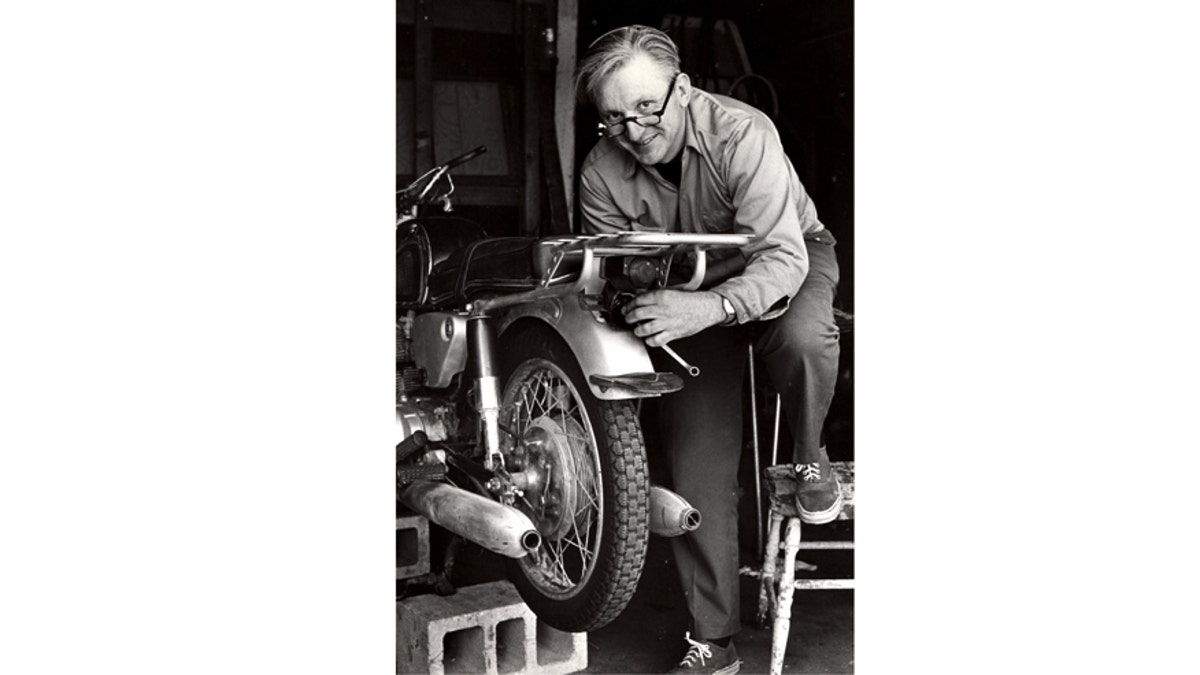
(AP)
Robert M. Pirsig, author of “Zen and the Art of Motorcycle Maintenance” died at his home in South Berwick, Maine on April 24.
The 88-year-old writer had been in poor health, according to his publishing hosue, William Morrow.
The philosophical 1974 novel was inspired by a motorcycle trip Persig took with his young son in the 1960s and became a cultural touchstone that sold over five-million copies worldwide after being rejected by over 100 publishers when he first shopped it around.
Like a cult favorite from the 1950s, Jack Kerouac's "On the Road," the book's path to the best-seller list was long and unlikely. It began as an essay he wrote after he and Chris rode from Minnesota to the Dakotas and grew to a manuscript of hundreds of thousands of words.
After the entire industry seemed to shun it, William Morrow took on the book, with editor James Landis writing at the time that he found it "brilliant beyond belief."
Pirsig's novel was in part an ode to the motorcycle and how he saw the world so viscerally traveling on one, compared to the TV-like passivity of looking out at the window of a car.
"Zen and the Art of Motorcycle Maintenance" ideally suited a generation's yearning for the open road, quest for knowledge and skepticism of modern values, while also telling a personal story about a father and son relationship and the author's struggles with schizophrenia.
A world traveler and former philosophy student, Pirsig would blend his life and learning, and East and West, into what he called the Metaphysics of Quality.
"But some things are better than others, that is, they have more quality," he wrote. "But when you try to say what the quality is, apart from the things that have it, it all goes poof! There's nothing to talk about. But if you can't say what Quality is, how do you know what it is, or how do you know that it even exists? If no one knows what it is, then for all practical purposes it doesn't exist at all. But for all practical purposes it really does exist."
The book was praised as a unique and masterful blend of narrative and philosophy and was compared to "Moby Dick" by New Yorker critic George Steiner, who wrote that Pirsig's story "lodges in the mind as few recent novels have." Writing in The New York Times, Edward Abbey was unsure how to categorize the book.
"Is 'Zen and the Art of Motorcycle Maintenance' a novel or an autobiography?" he wondered. "In this case the distinction seems of no importance; maybe it never was. Call the book, as Pirsig himself does, an inquiry. Therein lies its singular energy and force."
Pirsig's response to his unexpected success was to step away from it. He avoided interviews and took 17 years to complete "Lila: An Inquiry Into Morals," the sequel to his best-seller.
"It is not good to talk about Zen because Zen is nothingness," he told The Guardian in 2006. "If you talk about it you are always lying, and if you don't talk about it no one knows it is there."
A native of Minneapolis, Pirsig was a prodigy who at age 9 scored 170 on an IQ test and six years later graduated from high school. Army service in Korea at the end of World War II exposed him to Eastern thought and culture and profoundly influenced him.
He studied philosophy at the University of Minnesota, traveled to India and back in the states honed an enigmatic teaching style at Montana State College and at the University of Illinois, sometimes refusing to grade papers or asking students to grade each other.
At the same time, he suffered from anxiety so paralyzing that one day he was in a car with Chris and lost his way, needing his son to guide him home.
"I could not sleep and I could not stay awake," he told The Guardian. "I just sat there cross-legged in the room for three days."
Pirsig is survived by his wife, Wendy; son, Ted; daughter, Nell Peiken, and son-in-law, Matthew Peiken, along with three grandchildren.
Chris was killed by a mugger in 1979, and later editions of "Zen and the Art of Motorcycle Maintenance" would include an afterword about him. The author told The Guardian his son had not cared for the book.
"He said, 'Dad, I had a good time on that trip. It was all false,'" Pirsig explained. "It threw him terribly. There is stuff I can't talk about still."
The Associated Press contributed to this report